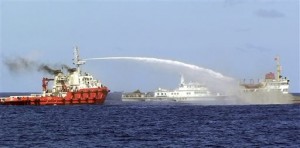Row over ‘provocative’ acts looms ahead of Asean talks

In this May 7, 2014 file photo released by Vietnam Coast Guard, a Chinese ship, left, shoots water cannon at a Vietnamese vessel, right, while a Chinese Coast Guard ship, center, sails alongside in the South China Sea, off Vietnam’s coast as Chinese ships are ramming at Vietnamese vessels trying to stop Beijing from setting up an oil rig in the sea. AP FILE PHOTO
SINGAPORE—A US and Southeast Asian push for a freeze in “provocative” acts in disputed waters has set the stage for a showdown with China at a regional security summit, analysts said.
Recent acts by China, including the positioning of an oil rig in waters also claimed by Vietnam, have alarmed neighbors and Washington ahead of the Asean Regional Forum (ARF) on Sunday in Myanmar’s capital Naypyidaw.
“The US is lobbying for a strong push at the ARF for adherence to international law to keep the situation in the South China Sea peaceful,” said Australia-based Southeast Asia expert Carl Thayer.
“It will also support a freeze on provocative activities,” he told Agence France-Presse, adding however that Beijing will likely “take a hard stance on US interference”.
The ARF is an annual security dialogue among foreign ministers of the 10-member Association of Southeast Asian Nations and key partners, including Australia, China, India, Japan, South Korea, Russia and the European Union.
Daniel Russel, US President Barack Obama’s pointman for East Asia, said that while Washington’s policy is not to “confront or contain China”, it will be frank during the discussions while seeking to lower tensions.
“We don’t pull punches. We don’t avoid difficult but important issues,” he told reporters in Washington ahead of the departure of his boss, US Secretary of State John Kerry, to Myanmar for the ARF and related meetings.
The one-day ARF is also expected to touch on nuclear-armed North Korea’s belligerence and territorial disputes between China and Japan in the East Sea.
‘Indisputable sovereignty’
Analysts said China is expected to reject calls for a freeze in activities in the South China Sea by insisting that these are not provocative.
Beijing maintains it has “indisputable sovereignty” over almost the entire sea, including waters, islands, reefs, shoals and outcrops nearer to other countries.
Asean states Brunei, Malaysia, the Philippines and Vietnam are claiming parts of the sea, while Taiwan is a sixth claimant.
Ties between China and Vietnam sank to their lowest point in decades after Beijing in May moved a deep-sea oil rig into disputed waters near the Paracel Islands, triggering deadly anti-China riots in Vietnam.
In March, China tried to block a resupply mission by Manila to a shoal in the Spratlys, after also seizing another South China Sea shoal from the Philippines in 2012.
Russel, the US Assistant Secretary of State for East Asian and Pacific Affairs, said “there is a risk of miscalculation and there is a risk that an incident could escalate and lead to a crisis”.
‘Legacy of tension’
The Philippines, which has challenged China’s claims before a UN tribunal, has also protested Chinese reclamation works in disputed reefs, including a suspected airstrip.
The Philippines said it will table a plan at the meeting that will address “provocative and destabilising activities” at sea.
It calls for an immediate moratorium on “specific activities that escalate tension”, the speedy conclusion of talks for a legally binding code of conduct, and the establishment of a dispute settlement mechanism anchored on international law, Manila’s foreign office said.
Southeast Asian diplomats said acts that raise tensions could include the building of new outposts and the seizing of islands and outcrops already occupied before 2002, when Asean and China signed a declaration to exercise self-restraint in the sea.
They could also cover construction and reclamation activities, particularly those that will fundamentally alter an island, shoal or reef.
In an apparent move to head off criticism at ARF, China last month withdrew the oil rig near Vietnam earlier than scheduled after the drilling company said its operations had been completed.
But Gregory Poling of the Washington-based Center for Strategic and International Studies said in a commentary that China’s withdrawal of the rig “does not represent a strategic shift in its approach to the South China Sea”.
“It is at best a tactical stepping down of tensions, not a permanent de-escalation,” he said.
US diplomat Russel said the withdrawal “removes one very, very serious irritant” in Vietnam-China ties.
“But it leaves behind a legacy of tension, of anger and of strains between China and Vietnam, and I think perhaps, more broadly, serious questions on the part of China’s neighbors about China’s long-term strategy.”














